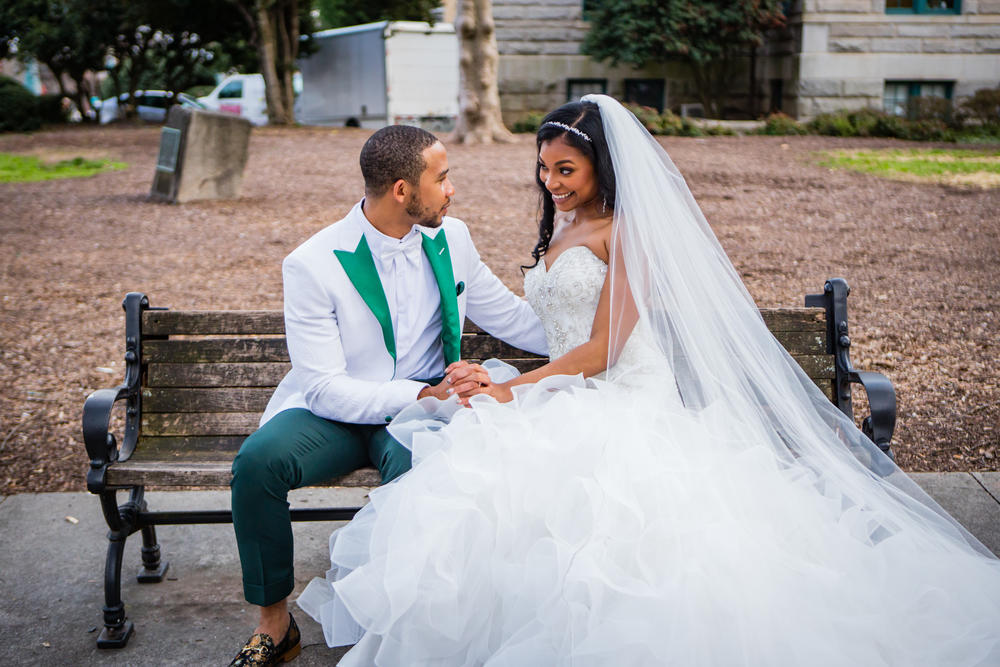Section Branding
Header Content
A Wedding Under The Wire: College Sweethearts Marry On The Eve Of CDC Policy Change
Primary Content
2018 was a big year for college sweethearts Téquan and Mikayla Taylor. Mikayla earned her master’s degree in public health, went to work full-time at the Centers for Disease Control and Prevention, and in June of that year, Téquan proposed.
He popped the question at Local Three Kitchen & Bar in Atlanta, and soon after the couple set their wedding date — for spring 2020.Couples around the world are suddenly postponing their weddings, but not because they have cold feet. This spring, there’s only one wedding crasher to blame: coronavirus. At least one Atlanta couple was able to tie the knot in the knick of time. GPB’s Leighton Rowell has more.
“We were always looking to March 14 and, you know, everything seemed like it was gonna be OK,” Mikayla said. “But as the days started moving closer, we did have some older family members say they couldn’t come anymore because of the coronavirus.”
At first, Mikayla said, the situation didn’t seem that serious, but as the big day drew near, more guests asked Mikayla and Téquan if the wedding was still on. Of course, they told them. Still, to put their friends and family at ease, Mikayla and Téquan announced on their wedding website that the venue and vendors were making special arrangements to keep everyone safe.
“But we told our guests that we understood if they couldn’t come anymore because of the coronavirus,” Mikayla said.
In the end, coronavirus fears led about 10 people to skip the wedding, and about 110 people attended.
“It was a beautiful, beautiful wedding,” Mikayla said. “Everyone that came was really excited to be there. There wasn’t any talk of coronavirus. Maybe it was a topic at the dinner tables, but we weren’t in those conversations.”
Mikayla and Téquan said they were grateful to be able to get married — because the day after their wedding, the CDC changed its guidelines for big events. On March 14, their wedding day, the CDC was still giving the green light to gatherings as large as 250 people. On March 15, the day after Mikayla and Téquan’s wedding, the CDC reduced that number to 50. By March 16, the new maximum was 10.
Téquan, who also works in the healthcare sector, said that the dramatic shift in policy was a wakeup call.
“Prior to the wedding we knew that we had people dropping out, but I don’t think we really grasped the severity of the matter until after the wedding,” he said. “I'm very thankful that we were able to with the wedding as planned.”
Mikayla, who works as a health communication specialist at the CDC, said if she and Tequan had scheduled their wedding for a date later in the spring, they wouldn’t have gone through with it.
“To really consider all of your family members, all of those people that could potentially be exposed, it’s just not worth the risk at that point,” she said. “I’m just so grateful that I barely made the cut.”
Téquan says their marriage is a source of comfort amid the uncertainty of the pandemic.
“I was completely happy in that moment, which I know sounds kind of crazy given everything that was going on in the world,” he said. “It felt absolutely right and I wouldn’t change it for the world. Even though coronavirus is raging I’m happy to be married to the love of my life.”
For now, their honeymoon to Puerto Rico is postponed. Instead, the newlyweds are working from home, doing their part to support a healthcare system in crisis.

